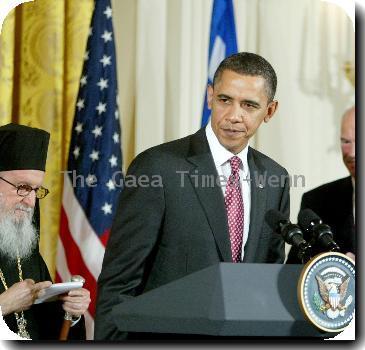UN’s Ban pushes for activating nuclear test ban treaty, asks, ‘How long must we wait?’
By Charles J. Hanley, APSaturday, May 8, 2010
‘How long a wait?’ Ban asks about nuke test treaty
UNITED NATIONS — An impatient U.N. Secretary-General Ban Ki-moon is pushing to set a deadline for activating the treaty banning all nuclear tests, stepping up pressure in a campaign to win over holdouts, including the U.S. Senate.
“The bottom line is this: It has been 15 years since the treaty was opened for signature. How long must we wait?” Ban asked delegates at the opening of a pivotal, monthlong conference on nuclear nonproliferation.
The U.S. Senate in 1999 rejected the “CTBT,” the Comprehensive Test-Ban Treaty, but President Barack Obama plans to resubmit the pact for ratification. Some Republicans are again mustering opposition, but Democrats are hopeful of approval next year.
Ban also said it’s time to consider creative ways to get around what may prove to be final die-hard obstacles to the treaty — possibly a resistant North Korea, or India and Pakistan.
Negotiated in the 1990s, the treaty specified 44 nuclear-capable states — from Algeria to Vietnam — that must give full approval before it can take effect.
Nine of those have not yet ratified, although one, Indonesia, announced at the start of the nonproliferation conference on Monday that it would soon approve the treaty. Like China, the Jakarta government had long indicated it would wait for the U.S. to act, but new Foreign Minister Marty Natalegawa said it would no longer be steered by U.S. decisions.
The other holdouts among the 44, besides the U.S., China and Indonesia, have been Egypt, India, Iran, Israel, North Korea and Pakistan. A total of 151 nations have ratified the pact.
Although earlier treaties outlawed all but underground nuclear blasts under 150 kilotons — equivalent to 150,000 tons of TNT — this one would impose a blanket ban on any test anywhere, putting the power of international law and U.N. Security Council enforcement behind the ban.
Major nuclear powers, including the U.S., have observed moratoriums on testing since the 1990s, but India, Pakistan and North Korea all have tested bombs since the CTBT was negotiated.
Tests help weapon designers build ever more compact, durable and finely tuned bombs. Ending testing would put a cap on developing new weapons, halting proliferation to more states and giving nuclear-armed states more confidence to negotiate deep reductions, treaty proponents say.
Senate opponents in 1999 objected that the U.S. might need to test to maintain a reliable nuclear stockpile, and the monitoring system of the treaty secretariat, the CTBT Organization, wouldn’t detect all clandestine tests by cheaters.
Today’s treaty supporters counter that the U.S. weapons stockpile has been certified reliable annually since the 1990s, and the $1 billion monitoring system of seismic and other detectors built up since 1999 has proven it can spot even small explosions.
Secretary-General Ban has a personal stake in the treaty, as chairman in the 1990s of its preparatory commission.
“The time has come to think very seriously about setting a time frame for ratification,” Ban told conference delegates last Monday. Some have suggested setting a target date of 2015.
Such a deadline would have only political, not legal force. It would be “a way of making the parties think harder about the need for entry into force of the treaty,” said Sergio Duarte, U.N. disarmament affairs chief.
Tibor Toth, head of the Vienna-based CTBT Organization, said he was optimistic about U.S. ratification if senators make a “realistic assessment” of where the world is headed in the coming decades without a treaty — that is, toward proliferation of nuclear weapons to more and more states. It takes two-thirds of the 100 senators to ratify a treaty.
“U.S. ratification is the defining ratification,” Toth said, pointing out that China and others would then come along.
As for Ban’s idea of finding an “alternative mechanism” for dealing with a final holdout or two, Toth said, “Certain countries are ready to think about provisional application.”
Provisional application is a principle of international law whereby treaty members can agree to put their pact into effect though it lacks the required ratifications. Treaty supporters say any North Korean nuclear test, for example, could then be detected by the monitoring system, without the onsite inspections provided for under the treaty, and the U.N. Security Council could take punitive action.
Tags: Asia, Barack Obama, China, East Asia, Greater China, India, International Agreements, Middle East, North America, North Korea, Nuclear Weapons, Pakistan, Political Issues, South Asia, United Nations, United States, Weapons Administration, Weapons Of Mass Destruction

